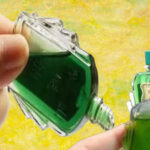What is the benefit of placing a ginger root at the bedside?

One of the popular tricks is to place a ginger root at the bedside.
This brings about the following advantages:
Sedative, Sleep Aid
A primary reason why many people place ginger at their bedside is its calming properties and ability to promote sleep. The aroma of ginger has a soothing effect on the nerves, relaxing the mind and reducing stress and anxiety. Having ginger by your pillow can create a pleasant atmosphere, making it easier to fall asleep and improving sleep quality.
Air Purification
In addition to aiding sleep, ginger also possesses deodorizing and air-purifying qualities. Placing ginger at the bedside helps eliminate unpleasant odors in the room, creating a more comfortable environment. Furthermore, ginger’s antibacterial properties inhibit the growth of bacteria and mold, contributing to cleaner air.
Relieves Stuffy Nose
Individuals prone to colds and stuffy noses may also benefit from placing ginger at their bedside. The fragrance of this spice helps clear the nasal passages. The anti-inflammatory properties of ginger oil also ease breathing by opening up the respiratory tract. A 2020 study revealed ginger’s anti-allergic and anti-inflammatory capabilities, indicating that daily exposure to its aroma is beneficial for overall health.
Enhances Libido
Scientific research has shown that ginger’s distinctive aroma comprises zingiberene and bisabolene. These compounds contribute to its characteristic spicy fragrance. The scent of ginger reduces feelings of loneliness and increases desire, particularly in the context of intimate relationships, thus inspiring couples. Therefore, placing ginger at the bedside can kindle the flames of passion in married life.
Repels Insects
Another benefit of the habit of placing ginger at the bedside is its ability to repel insects, especially mosquitoes. While the distinctive aroma of ginger is pleasing to humans, it elicits fear in certain insects. For families with young children, using ginger as a mosquito repellent is a safe alternative to chemical products that may be harmful to health.
Optimal Placement of Ginger at the Bedside
Many people opt to place the entire ginger root at their bedside, but this may not be the most effective approach. To maximize the release of its aroma, it is recommended to slice the ginger into thin pieces or chop it finely, and then place it in a cloth bag, securely tied.
Alternatively, you can reuse disposable masks by cutting the ginger into small pieces and placing them inside, using the ear loops to secure the mask closed. Hang this ginger sachet at your bedside or keep it under your pillow to allow the fragrance to permeate the surroundings.
Precautions When Consuming Ginger

What is the benefit of placing a ginger root at the bedside that makes it so popular?
First and foremost: Moderation is key
During the summer, our bodies tend to lose more water. Ginger, being a typically spicy and hot food, should not be consumed in excess. When cooking or preparing beverages, a few slices of ginger are sufficient; there is no need to overuse this ingredient.
Second: Even good things have their limitations!
Fresh ginger cooked with red sugar is commonly used to treat wind-cold, colds, and stomach coldness.
However, ginger itself is hot in nature and is only suitable for treating illnesses caused by cold energy. Therefore, those suffering from sunstroke or wind-heat-induced colds should refrain from using ginger remedies.
Third: Don’t peel the ginger!
Many people, when preparing ginger, tend to peel it, believing it to be more “hygienic.” However, removing the outer layer diminishes the full potential of ginger’s benefits.
Fourth: Discard spoiled ginger
Ginger that has deteriorated (bruised, rotten, or sprouted) can produce potent toxins, leading to cell necrosis and potentially causing severe illnesses such as liver or esophageal cancer.
Fifth: Ginger is not for everyone
Due to its spicy and hot nature, ginger may not be suitable for individuals with certain conditions: those with yin deficiency and yang excess; individuals with internal heat; or those suffering from boils, ulcers, or open wounds.
Similarly, people with specific lung conditions (pneumonia, lung abscess, lung abscess with pus, or tuberculosis); stomach ulcer patients; those with kidney problems (ruptured kidney, nephritis); individuals with cholecystitis, diabetes, or hemorrhoids should also refrain from excessive ginger consumption.





































